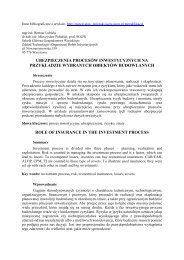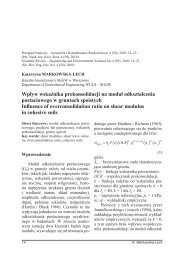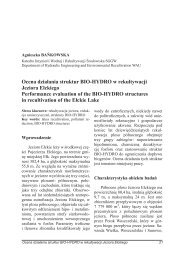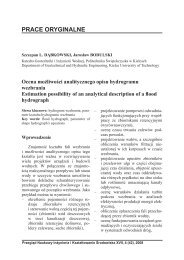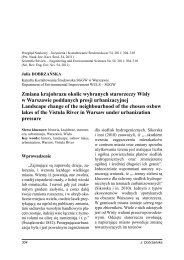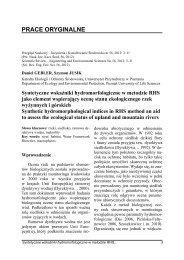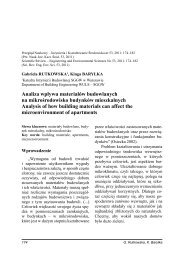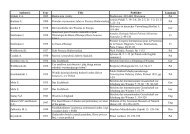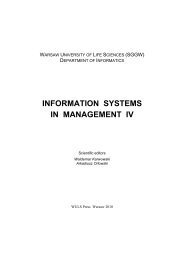40 S. Kalinowskitake up the job incompatible with their aspirations. Simultaneously the fear concerning theincomes loss causes that this group more often decides to work in lower safety standards orthreatening health. People without education or of general education three times more oftendemonstrate the fear concerning the loss their work than the people with higher education(adequately 76%, 73% and 23,4%). They think that in relation to the lack of the adequateskills and realized trainings and courses they may be deprived of the job by employer.Financial limitations result in a low degree of rural youth’s involvement in extracurricularactivities aimed to develop their skills. This results in a decline in the developmentpotential of the group. According to Nelson and Phelps [1966], the technical society isobliged to make increasing investments in its own development in order to meet increasingtechnological expectations as the economy becomes saturated with imported knowledge.However, research shows that two out of five households are forced to reject anyextracurricular activities. It is a growing concern that in times of globalisation, only onefamily in four allocates extra money to studying foreign languages (Figure 5).The increase of the percentage of people supplementing their education is beneficialfor the whole society, as better educated people are able to decide on implementing innovationsfaster and use new techniques more effectively [Zajączkowska-Jakimiak 2006].Academic education is conducive to an increased flexibility in the labour market and aneasier adjustment to it and also influences the readiness to start work. Research showsthat people with academic and post-comprehensive education are more often ready tostart work instantly than people with vocational education or those without any education(Figure 6). A low percentage of people ready to start work instantly in all groups can bea symptom of accepting the hitherto situation, but also result from starting unregisteredwork. Accepting this form of work results mainly from the willingness to be paid a slightlyhigher salary and to improve one’s material situation at the expense of future security.The level of education correlates with the evaluation of one’s own material situation.It also affects the mentality of the respondents and, to a significant degree, determines theperception of reality. The households whose heads of family have academic educationevaluate better their own material situation in comparison with other households (Figureother – inne3,4private lessons, trainings – korepetycjecomputer classes – zajęcia komputerowe88,5music, rhytmics, dance – muzyka, rytmika, taniec13,4sports – sportforeign languages – języki obce24,124,7none – nie korzysta z żadnych43,20 5 10 15 20 25 30 35 40 45 50Fig. 5.Rys. 5.Source:Źródło:Using extracurricular classes by rural youthKorzystanie z zajęć nadobowiązkowych wśród młodzieży wiejskiejAuthor’s own research.Badania własne.Acta Sci. Pol.
Education as an element of competitiveness of rural households in the Wielkopolskie... 41junior high and lower –gimnazjalne i niższe34,665,4vocational – zasadniczezawodowe21,778,3general secondary –średnie ogólnokształcące31,368,8modern technical – średniezawodowe29,670,4post-comprehensive –policealne50,050,0academic – wyższe50,050,0tak – yes nie – no0% 10% 20% 30% 40% 50% 60% 70% 80% 90% 100%Fig. 6. Readiness to start work (in %)Rys. 6. Gotowość podjęcia pracy (%)Source: Author’s own research.Źródło: Badania własne.junior high and lower – gimnazjalne i niższegeneral secondary – średnie ogólnokształcącemodern technical – średnie zawodowebetter – lepszaworse – gorszavocational – zasadnicze zawodowe7). Therefore, it can be assumed that academic education provides greater chances of adaptationto current living conditions and is conducive to a greater satisfaction with one’sown financial situation.People with post-comprehensive and higher education are more willing to take up therisk than the people with lower education. They more often are decided to undertake theirown business. Nearly 40% people with higher and 59% of post comprehensive educationare willing to start their own business when they lose their job, whereas 28.9% people withOeconomia 10 (1) 2011post-comprehensive – policealneacademic – wyższesimilar – podobna11,45,415,816,610,733,380,771,477,274,684,266,713,917,98,911,40% 20% 40% 60% 80% 100%Fig. 7. Self-evaluation of households’ material situation in 2007Rys. 7. Samoocena sytuacji materialnej gospodarstw domowych w 2007 rokuSource: Author’s own research.Źródło: Badania własne.00
- Page 6 and 7: 6 A. Gawrońska, S. Paszkowskicultu
- Page 8 and 9: 8 A. Gawrońska, S. Paszkowskinumbe
- Page 10 and 11: 10 A. Gawrońska, S. PaszkowskiTabl
- Page 12: 12 A. Gawrońska, S. PaszkowskiTabl
- Page 15 and 16: The distribution of social security
- Page 17 and 18: %180,0160,0140,0120,0100,080,060,04
- Page 19: The distribution of social security
- Page 22 and 23: 22 R. Hryniewski, W. Mądry, D. Goz
- Page 24 and 25: 24 R. Hryniewski, W. Mądry, D. Goz
- Page 26 and 27: 26 R. Hryniewski, W. Mądry, D. Goz
- Page 28 and 29: 28 R. Hryniewski, W. Mądry, D. Goz
- Page 30 and 31: 30 R. Hryniewski, W. Mądry, D. Goz
- Page 32 and 33: 32 R. Hryniewski, W. Mądry, D. Goz
- Page 35 and 36: Oeconomia 10 (1) 2011, 35-43EDUCATI
- Page 37 and 38: Education as an element of competit
- Page 39: Education as an element of competit
- Page 43: Education as an element of competit
- Page 46 and 47: 46 E. Majewski, P. Sulewski, M. Rag
- Page 48 and 49: 48 E. Majewski, P. Sulewski, M. Rag
- Page 50 and 51: 50 E. Majewski, P. Sulewski, M. Rag
- Page 52 and 53: 52 E. Majewski, P. Sulewski, M. Rag
- Page 54 and 55: 54 E. Majewski, P. Sulewski, M. Rag
- Page 56 and 57: 56 E. Majewski, P. Sulewski, M. Rag
- Page 58 and 59: 58 L. Mazal, K.J. RowlesIn the West
- Page 60 and 61: 60 L. Mazal, K.J. RowlesThe most im
- Page 62 and 63: 62 L. Mazal, K.J. RowlesGDPt= GDP0+
- Page 64 and 65: 64 L. Mazal, K.J. RowlesTHE TIME SE
- Page 66 and 67: 66 L. Mazal, K.J. RowlesTable 4. Ac
- Page 68 and 69: 68 L. Mazal, K.J. RowlesNelson Ch.R
- Page 70 and 71: 70 A. Ptak-Chmielewskastatistics, w
- Page 72 and 73: 72 A. Ptak-Chmielewska3025birth rat
- Page 74 and 75: 74 A. Ptak-ChmielewskaSECTOR OF ACT
- Page 76 and 77: 76 A. Ptak-Chmielewskabirth rate fo
- Page 78 and 79: 78 A. Ptak-Chmielewskawere trade fi
- Page 80 and 81: 80 A. Ptak-ChmielewskaREFERENCESBal
- Page 83 and 84: Oeconomia 10 (1) 2011, 83-95THE EFF
- Page 85 and 86: The effi ciency of selected real es
- Page 87 and 88: The effi ciency of selected real es
- Page 89 and 90: Table 1. Efficiency of real estate
- Page 91 and 92:
The effi ciency of selected real es
- Page 93 and 94:
The effi ciency of selected real es
- Page 95:
The effi ciency of selected real es
- Page 98 and 99:
98 J. Sosnowski, G.A. CiepielaJalin
- Page 100 and 101:
100 J. Sosnowski, G.A. Ciepiela2007
- Page 102 and 103:
102 J. Sosnowski, G.A. CiepielaTabl
- Page 104 and 105:
104 J. Sosnowski, G.A. CiepielaTabl
- Page 106 and 107:
106 J. Sosnowski, G.A. Ciepiela1400
- Page 108 and 109:
108 J. Sosnowski, G.A. CiepielaOsek
- Page 110 and 111:
110 E. SzymańskaProducts by Activi
- Page 112 and 113:
112 E. Szymańskatroduced TFI which
- Page 114 and 115:
114 E. Szymańskabers of companies
- Page 116 and 117:
116 E. SzymańskaTable 3. Tourism v
- Page 118 and 119:
118 E. SzymańskaREFERENCESCoccossi
- Page 120 and 121:
120 J. WiśniewskaEvery society can
- Page 122 and 123:
122 J. WiśniewskaStatistical analy
- Page 124 and 125:
124 J. WiśniewskaCommon Agricultur
- Page 126 and 127:
126 J. WiśniewskaTable 3. An attem
- Page 128 and 129:
128 J. Wiśniewskathe application o
- Page 130 and 131:
130 J. Wiśniewskainstitutional cos
- Page 132 and 133:
132 J. Wiśniewskaemployed in agric
- Page 134 and 135:
134 J. WiśniewskaLong term viabili
- Page 136 and 137:
136 J. Wiśniewska--The level of re
- Page 139 and 140:
Oeconomia 10 (1) 2011, 139-148INNOV
- Page 141 and 142:
Innovativeness of food production e
- Page 143 and 144:
Innovativeness of food production e
- Page 145 and 146:
Innovativeness of food production e
- Page 147 and 148:
Innovativeness of food production e
- Page 149 and 150:
Oeconomia 10 (1) 2011, 149-158LOCAL
- Page 151 and 152:
Local governance activities in supp
- Page 153 and 154:
Local governance activities in supp
- Page 155 and 156:
Local governance activities in supp
- Page 157 and 158:
Local governance activities in supp
- Page 159 and 160:
Oeconomia 10 (1) 2011, 159-169CHANG
- Page 161 and 162:
Changes in rural women’s movement
- Page 163 and 164:
Changes in rural women’s movement
- Page 165 and 166:
Changes in rural women’s movement
- Page 167 and 168:
Changes in rural women’s movement
- Page 169:
Changes in rural women’s movement
- Page 172:
Ewa SzymańskaTourism function of M




